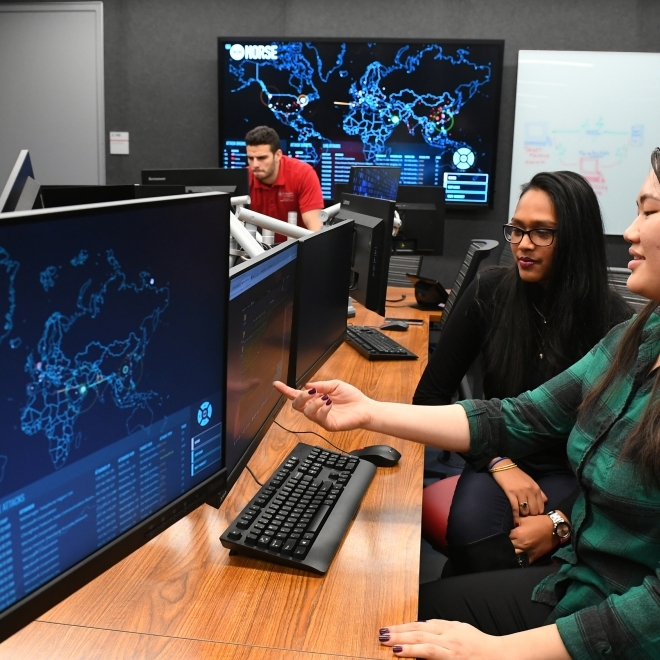Information Security vs Cyber Security: Are They the Same?

In the digital world we live in today, the terms “information security” and “cybersecurity” are often used interchangeably. However, despite their similarities, the two concepts have a few key differences that are important to understand.
This blog post explores these concepts in detail, breaking down the key distinctions and similarities between information security and cybersecurity. Additionally, we delve into the exciting world of cyber and information security careers, uncovering overlapping skills and discussing what you can do with a master’s degree in this dynamic field.
I. Security vs. Cybersecurity
What is Information Security?
The National Institute of Standards and Technology (NIST) has categorized information and cybersecurity as separate but connected topics. NIST defines information security as “protecting information and information systems from unauthorized access, use, disclosure, disruption, modification, or destruction to provide confidentiality, integrity, and availability.”
Information security includes physical and environmental security, access control, and cybersecurity.
What is Cybersecurity?
NIST defines cybersecurity as “preventing damage to, protection of, and restoration of computers, electronic communications systems, electronic communications services, wire communication, and electronic communication, including information contained therein, to ensure its availability, integrity, authentication, confidentiality, and nonrepudiation.”
Cybersecurity is generally considered a subsection of information security and is one part of an overall information risk strategy. It refers to the technological security aspect of information security.
Related: The Impact of Cybersecurity
Knowing the Key Differences
The most significant distinction between information security and cybersecurity is that information security encompasses protecting information regardless of the medium. In contrast, cybersecurity focuses on data within the cyber and digital realm. Before most data was stored electronically, it was held by physical means. While many organizations have transitioned to digital data, some confidential and sensitive information is kept in a physical storage method. Information security is responsible for the continued protection of this data, regardless of the format.
II. Commonalities between Information and Cyber Security
One of the commonalities between the two is the use of confidentiality, integrity, and availability, also known as the CIA Triad, as an integral part of the risk strategy for both. Cyber and information security utilize the CIA Triad to drive policy and procedure to protect information and data regardless of the format.
Another commonality between the two is increasing governmental regulation and higher industry standards over information and cybersecurity. Both cybersecurity and information security often align with regulatory requirements and industry standards. Compliance with standards like ISO 27001, NIST, or General Data Protection Regulation involves considerations from both domains. Part of these regulations and industry standards also include incident response and management.
Responding to and managing security incidents is a shared concern. Whether a cyberattack on a network or a breach compromising sensitive information, both cybersecurity and information security teams need effective incident response plans.
III. Careers in Cybersecurity and Information Security
Exploring career paths in cyber and information security offers an exciting journey into digital defense’s dynamic and rapidly evolving landscape. As technology becomes increasingly integrated into every facet of our lives, the demand for skilled professionals adept at safeguarding sensitive information has never been higher. Cybersecurity careers span various roles, from ethical hackers and penetration testers who identify vulnerabilities, to security analysts and incident responders who actively protect against threats.
Professionals in this field play a critical role in thwarting cyberattacks, ensuring data integrity, and maintaining the confidentiality of digital assets. The diverse nature of cyber and information security allows individuals to specialize in areas such as cryptography, network security, or risk management. With the constant evolution of cyber threats, exploring this field promises a challenging and intellectually stimulating career. It provides an opportunity to make a meaningful impact in securing the digital world.
Related: What Does a Career in Cyber and Information Security Look like?
Overlapping Skill Requirements
In the ever-evolving cyber and information security landscape, possessing a diverse skill set is crucial for staying ahead of potential threats. Some in-demand skills required for a successful career in this field include
Technical Proficiency:
- Network Security: Understanding and securing networks against unauthorized access and attacks
- Penetration Testing: Identifying vulnerabilities and weaknesses in systems through ethical hacking
- Cryptography: Knowledge of encryption techniques to protect data confidentiality and integrity
Knowledge of Security Frameworks and Tools:
- Familiarity with Security Tools: Expertise in using tools like Wireshark, Nmap, and Metasploit for testing and monitoring
- Understanding of Security Frameworks: Knowledge of industry standards like NIST, ISO 27001, and the Center for Internet Security® to implement effective security measures
Incident Response and Forensics:
- Incident Response Planning: Developing and implementing strategies to handle security incidents effectively
- Digital Forensics: Investigating and analyzing cyber incidents to identify the root cause and mitigate future risks
Risk Management:
- Risk Assessment: Evaluating potential risks and vulnerabilities to develop proactive security measures
- Compliance Knowledge: Staying updated on industry regulations and compliance standards to ensure adherence
IV. What Can You Do with a Degree in Information and Cybersecurity?
A master’s degree in cyber and information security opens many career paths, allowing professionals to specialize in various aspects of cybersecurity. Some potential career paths for individuals with a master’s degree in this field are
Cybersecurity Analyst:
An analyst’s responsibilities include monitoring network traffic, analyzing security logs, and responding to security incidents to protect an organization’s information assets.
Penetration Tester (Ethical Hacker):
Conduct security assessments and penetration tests to identify vulnerabilities in systems, applications, and networks, providing recommendations for improvement.
Security Consultant:
Work for consulting firms or independently to advise organizations on enhancing their security posture, risk management, and compliance with industry standards.
Security Architect:
Design and implement secure systems and network architectures, ensuring that new technologies align with the organization’s security policies and standards.
Incident Responder:
Specialize in responding to and mitigating security incidents, conducting digital forensics, and developing incident response plans to minimize future risks.
Security Researcher:
Engage in cutting-edge research to identify emerging threats, vulnerabilities, and innovative security solutions, contributing to the advancement of the cybersecurity field.
Threat Intelligence Analyst:
Monitor and analyze cyber threats, providing timely and actionable intelligence to help organizations proactively defend against potential attacks.
The dynamic nature of the cybersecurity field allows individuals with a master’s degree to tailor their careers to specific interests, whether in technical roles, leadership positions, or specialized areas such as blockchain or cloud security. Continuous learning and staying current with industry trends are crucial to success in this rapidly evolving domain.
Earn a Master’s Degree in Cyber and Information Security at St. John’s University.
Cybersecurity is a rapidly evolving field, with new challenges emerging every day. However, with the right skills and knowledge, you can make a real difference in protecting against these attacks and securing our digital world. By earning a Master of Science (M.S.) in Cyber and Information Security, you can join a thriving community of professionals dedicated to safeguarding our digital future and positively impacting the world of technology.






